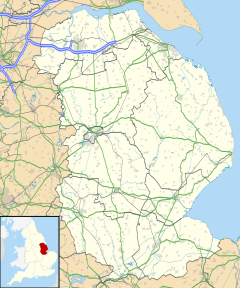Glentham is a village and civil parish in the West Lindsey district of Lincolnshire, England. It is situated on the A631, 6 miles (9.7 km) west from Market Rasen, and 2 miles (3.2 km) east from Caenby Corner and the A15. The village includes the hamlet of Caenby.
| Glentham | |
|---|---|
 Church of SS Peter and Paul, Glentham | |
Location within Lincolnshire | |
| Population | 508 (2011) |
| OS grid reference | TF000907 |
| • London | 130 mi (210 km) S |
| District | |
| Shire county | |
| Region | |
| Country | England |
| Sovereign state | United Kingdom |
| Post town | Market Rasen |
| Postcode district | LN8 |
| Police | Lincolnshire |
| Fire | Lincolnshire |
| Ambulance | East Midlands |
| UK Parliament | |
Etymology
editThe Oxford Dictionary of English Place Names gives the derivation of the name Glentham as glente + hām, meaning either ″homestead frequented by birds of prey″ or ″homestead at a lookout place″. Caenby is said to probably mean ″farmstead or village of a man called Cāfna or Kafni″.[1]
Domesday Book
editGlentham was mentioned in the Domesday Book of 1086, as being in the Aslacoe hundred in the West Riding of Lindsey. It had a total population of 64 households (very large for the time) with tax assessment of 8 geld units (again very large). Land in Glentham was held by four separate lords before the Norman conquest and three afterwards:
Lord in 1066: Lincoln St Mary, bishop of. Lord in 1086: Lincoln St Mary, bishop of. Tenant-in-chief in 1086: Lincoln St Mary, bishop of.
Lord in 1066: Thorgisl. Lord in 1086: Rainfrid. Tenant-in-chief in 1086: Ivo Tallboys.
Lords in 1066: Estan of Farningham; Wulfmer. Lord in 1086: Wadard of Cogges. Tenant-in-chief in 1086: Bishop Odo of Bayeux.[2]
Religious Buildings
editGlentham Grade I listed Anglican church is dedicated to St Peter and St Paul.[3] Originating in the 13th century, it has had additions and changes up to the 20th. It is mainly Perpendicular in style.[4] Nikolaus Pevsner dates the tower from 1756, and a stained glass window by Christopher Whall from 1915.[5] In the chancel and the north aisle are monuments and brasses to the Tourney family of Cavenby. Set within a niche over the south porch is an image of Pieta holding the dead Christ. At the west of the church is a mutilated 14th-century brass effigy of a female;[4] previously known as "Molly Grime", it was, up to 1832, washed every Good Friday by seven old maids.[6]
In 1885 Kelly's Directory recorded both a Wesleyan and Primitive Methodist chapel, and a nearby barrow.[7] At that time much land in the area was given over to pasture, while main crops grown were wheat, barley and beans.[8]
The ecclesiastical parish is part of the Owmby Group of parishes.[9]
Amenities
editGlentham has a public house, The Crown Inn, a shop, a garden centre (with associated business units) and a village hall.
Other
editThe village gave its name to a Ham class minesweeper, HMS Glentham.[10][11]
References
edit- ^ Oxford Dictionary of English Place-Names, A. D. Mills.
- ^ [1] Archived 2 April 2015 at the Wayback MachineDomesday Book. Retrieved 15 March 2015
- ^ Historic England. "Church of St Peter and St Paul (1165045)". National Heritage List for England. Retrieved 7 August 2011.
- ^ a b Cox, J. Charles (1916) Lincolnshire pp. 136, 137; Methuen & Co. Ltd
- ^ Pevsner, Nikolaus; Harris, John; The Buildings of England: Lincolnshire p. 248; Penguin, (1964); revised by Nicholas Antram in 1989, Yale University Press. ISBN 0-300-09620-8
- ^ Gentleman's Magazine 1865; part 2, pp. 205-7
- ^ Historic England. "D-shaped barrow and enclosure 250m east of New Close Plantation (1017333)". National Heritage List for England. Retrieved 7 August 2011.
- ^ Kelly's Directory of Lincolnshire with the port of Hull 1885, p. 415
- ^ "Owmby Group of Parishes". Archived from the original on 23 August 2011. Retrieved 7 August 2011.
- ^ "HMS Glentham", Clydesite.co.uk. Retrieved 23 June 2013
- ^ [2] Archived 9 August 2010 at the Wayback Machine, Genuk site. Retrieved 15 March 2015
External links
edit- Media related to Glentham at Wikimedia Commons
- "Glentham" Archived 9 August 2010 at the Wayback Machine, genuki.org.uk. Retrieved 7 August 2011
